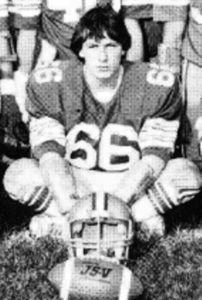The Effects of Concussions
The following Monday afternoon I went to football practice and sat with the team in the locker room to review the game film with the coaches. The head coach stopped the film after the kickoff and said, “The coaches and I have never seen a player run so fast down the field on a kickoff!”
My teammates proudly pointed to me and called out my name. The head coach smiled and nodded at me and then continued the film. A few seconds later he stopped it and looked back at me with an odd look on his face. He said, “When the coaches and I reviewed the film over the weekend we realized you weren’t in the game!”
I told him I got a bloody nose while making the tackle he had just shown on the film and it wouldn’t stop bleeding so I couldn’t return to play. He gave me a long look like I was full of crap and then he went back to reviewing the film with the team. I wanted to tell him the truth that afternoon, but I didn’t know how.
From that point on I just stopped going to football practice and began taking the bus home after school. During that time of day, I was usually running plays at full speed and hammering people into the dirt with my body. Hits that many of my former teammates recently told me were the hardest hits they had ever received from anyone while playing football.
I had tremendous guilt, anxiety, depression, sensitivity to noise and light and other concussion symptoms. I was so tired during and after school all I could do was go into my bedroom and sleep in the dark. I couldn’t concentrate in class or on my homework and quickly fell behind academically.
I lost a lot of friends and was ridiculed in the high school halls for betraying and abandoning the team. I had become accustomed to being called an Athlete, Offensive Guard, Defensive Tackle, Linebacker, First Baseman, Pitcher, Hurdler, Relay Racer, Sprinter, Defenseman, Forward, Captain, Co-Captain, All-Star, Varsity and Champion. For the first time ever I was being called a quitter and even the people calling me that said it in a way that they couldn’t believe the word was rolling off of their tongues. They were angry at me and I wasn’t providing them with an explanation. I guess it was better to be called a quitter than a pussy.
I was held after a class by the head coach after they had lost the championship game. I knew “the talk” was eventually going to happen. He asked me several questions and I avoided answering them truthfully because I wasn’t going to tell him about my concussion problem. I just wanted to fade away rather than deal with my concussions. I don’t blame him at all for what happened next because I didn’t disclose my concussions to him.
All of my grades dropped to all F’s and I dropped out of high school half way through my junior year. I was engaging in risky behavior that was hurting me and a lot of other people. Family and friends tried to help me, but I was so depressed I just wanted to end my life. An uncle found me sitting on my bed all alone in the dark with a loaded shotgun held to my head. I am alive today because of him.
I was sent to the mental ward of the hospital where I had been treated many times for sports injuries such as stitches to the head, broken fingers, concussions, etc. This time, like the times before, they didn’t want to talk about concussions and they drugged my mind into oblivion. I spent a month in a drugged induced fog. They released me back into the world in the worst physical and mental condition I had ever been in and just in time for football double sessions.
 I showed up for football practice for the 1986 season like an alcoholic looking for another drink or a drug addict looking for another fix. The new head coach looked at me and made me a running back. After a few weeks, I decided my heart wasn’t in it. I was at a major crossroads and needed to make the right decisions to move forward in the right direction.
I showed up for football practice for the 1986 season like an alcoholic looking for another drink or a drug addict looking for another fix. The new head coach looked at me and made me a running back. After a few weeks, I decided my heart wasn’t in it. I was at a major crossroads and needed to make the right decisions to move forward in the right direction.
Even though my sports concussion experience was 30 years ago, athletes are still following in my footsteps due to the same stigma and stubbornness I had in which I failed to realize that the brain isn’t that tough and it can’t “suck up” the damage from repeated blows and concussions.
This article was published, in its entirety, by the Good Men Project. Reprinted with permission.




